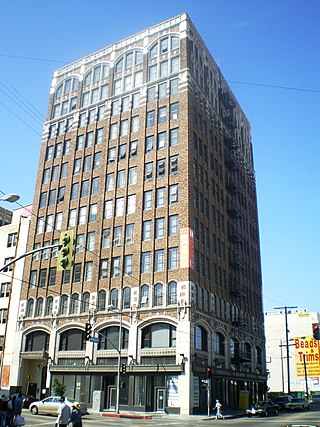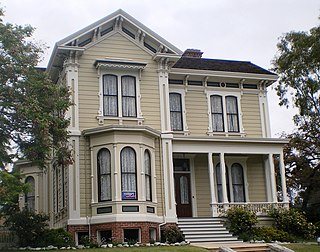
Angelino Heights, alternately spelled Angeleno Heights, is one of the oldest neighborhoods in Los Angeles. Situated between neighboring Chinatown and Echo Park, the neighborhood is known for its concentration of eclectic architectural styles from three eras: The Victorian, Turn of the Century and Revival eras. Carroll Avenue is listed on the National Register of Historic Places and there are over thirty Historic-Cultural Monuments in the neighborhood.

The Eastern Columbia Building, also known as the Eastern Columbia Lofts, is a thirteen-story Art Deco building designed by Claud Beelman located at 849 S. Broadway in the Broadway Theater District of Downtown Los Angeles. It opened on September 12, 1930, after just nine months of construction. It was built at a cost of $1.25 million as the new headquarters and 39th store for the Eastern-Columbia Department Store, whose component Eastern and Columbia stores were founded by Adolph Sieroty and family. At the time of construction, the City of Los Angeles enforced a height limit of 150 feet (46 m), however the decorative clock tower was granted an exemption, allowing the clock a total height of 264 feet (80 m). J. V. McNeil Company was the general contractor.

The California Club is an invitation-only private club established in 1888, based in Los Angeles, California.

The Los Angeles Fire Department Museum and Memorial is located at Old Engine Co. No. 27, also known as Fire Station No. 27, on Cahuenga Boulevard in Hollywood. The museum houses old fire engines and fire apparatus, some dating from the 1880s. The museum also houses a reference library and fire safety learning center. The building was named a Los Angeles Cultural-Heritage Monument in 1976 and was listed in the National Register of Historic Places in 1985. The Fallen Firefighters Memorial in front of the station consists of a memorial wall listing all of the Los Angeles firefighters who have died in the line of duty and five life-size statues of firefighters.

Textile Center Building is a 12-story Gothic Revival and Italian Renaissance Revival architectural styled brick building located in the Los Angeles Fashion District. Designed by William Douglas Lee in the Gothic Revival style, the building opened in 1926 as a center for garment manufacturing. It has since been converted to condominiums.

Los Angeles Historic-Cultural Monuments are sites which have been designated by the Los Angeles, California, Cultural Heritage Commission as worthy of preservation based on architectural, historic and cultural criteria.

Victoria Park is a neighborhood in the central region of Los Angeles, California. There are three Los Angeles Historic-Cultural Monuments located in Victoria Park.

The Janss Investment Company Building, also known as the Janss Dome, is a historic building in Westwood, Los Angeles, California, in the Westwood Village. The building is located at the five-way intersection of Westwood Boulevard, Kinross Avenue, and Broxton Avenue.

Foy House is a Victorian Italianate-style house that was built in 1872, located in Los Angeles, California. It was the eighth property in Los Angeles to receive Historical-Cultural Monument status.

The Coca-Cola Building is a Coca-Cola bottling plant modeled as a Streamline Moderne building designed by architect Robert V. Derrah with the appearance of a ship with portholes, catwalk and a bridge from five existing industrial buildings in 1939. It is located at 1334 South Central Avenue in Los Angeles, California. It was designated Los Angeles Historic-Cultural Monument Number 138 on 5 Feb 1975. It is often referred to as the Coke Building.

Walker & Eisen (1919−1941) was an architectural partnership of architects Albert R. Walker and Percy A. Eisen in Los Angeles, California.
Foreman & Clark was a department store chain headquartered in downtown Los Angeles, California, United States. Founded in 1909, the chain had 90 stores by 1957, from California to New York, and closed in 1999.

The 28th Street YMCA is a historic YMCA building in South Los Angeles, California. It was listed as a Los Angeles Historic-Cultural Monument in 2006 and put on the National Register of Historic Places in 2009. The four-story structure was built in 1926 at a cost of $200,000. The building was designed by noted African American architect Paul R. Williams in the Spanish Colonial Revival style.

The Broadway Hollywood Building is a building in Los Angeles' Hollywood district. The building is situated in the Hollywood Walk of Fame monument area on the southwest corner of the intersection referred to as Hollywood and Vine, marking the intersection of Hollywood Boulevard and Vine Street. It was originally built as the B. H. Dyas Building in 1927. The Broadway Hollywood Building is referred to by both its main address of 6300 Hollywood Boulevard and its side address of 1645 Vine Street.

7th Street is a street in Los Angeles, California running from S. Norton Ave in Mid-Wilshire through Downtown Los Angeles. It goes all the way to the eastern city limits at Indiana Ave., and the border between Boyle Heights, Los Angeles and East Los Angeles.















